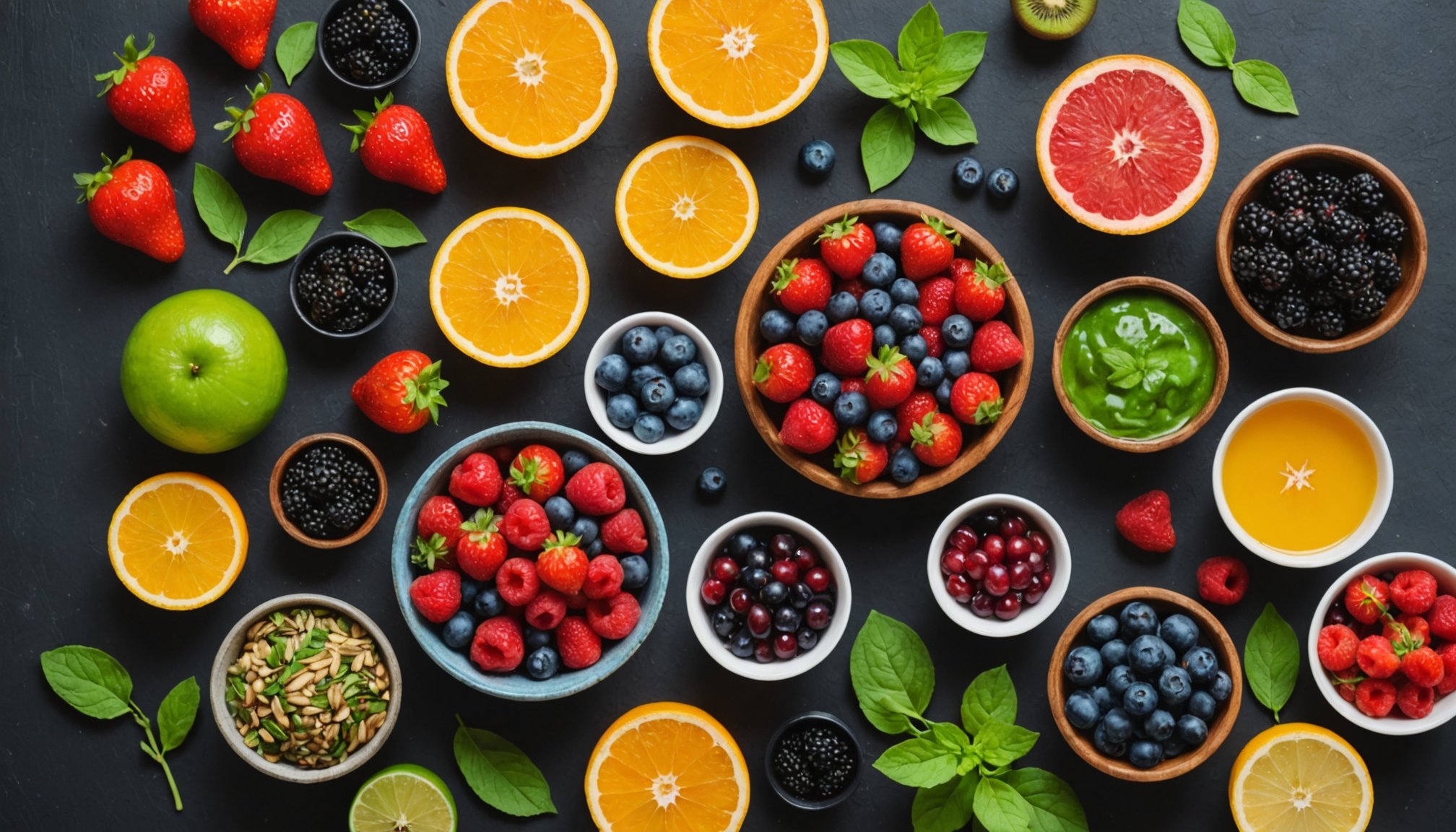Understanding Antioxidants and Their Importance
Antioxidants are naturally occurring compounds that help to protect the body from damage caused by free radicals, unstable molecules that can harm cells and contribute to aging and diseases. Various types of antioxidants include vitamins C and E, beta-carotene, and minerals such as selenium. These compounds can be found in many fresh fruits and vegetables, often contributing to their vibrant colours.
The health benefits of antioxidants are vast. By neutralising free radicals, antioxidants reduce oxidative stress and play a pivotal role in supporting overall health. This protective function is crucial in maintaining wellness and preventing the early onset of chronic diseases. Regular intake of antioxidants is associated with a lower risk of heart disease, cancer, and other degenerative conditions.
In the same genre : Elevate your omega-3 consumption: easy strategies to enrich the uk diet
The UK diet can be naturally rich in these beneficial compounds, especially when it includes a variety of colourful plant-based foods. Boosting antioxidant consumption is therefore crucial not only for disease prevention but also for promoting longevity and improving quality of life as one ages. Incorporating a diverse array of antioxidant-rich foods ensures the full spectrum of these health benefits.
Antioxidant-Rich Foods Commonly Found in the UK
Discovering antioxidant-rich foods available in the UK is both a journey of exploration and a step towards better health. Seasonal availability often influences the variety and freshness of these foods. Among the top on the list are vibrant berries like blueberries, raspberries, and strawberries, known for their potent antioxidant profile. During the summer, these berries are at their peak, offering maximum flavour and nutrients.
Have you seen this : Maximize your workout: crafting an effective home fitness plan for uk residents with limited space
Additionally, vegetables such as kale, broccoli, and spinach remain staples for their high antioxidant content. These greens are available year-round and form the cornerstone of many healthy diets. Tomatoes and red peppers also deserve a spot on your shopping list, as they are rich in vitamins A, C, and antioxidants like lycopene.
Each food comes with a unique nutrition profile. Blueberries, for example, are renowned for their high levels of flavonoids, which support brain health. Kale is loaded with vitamins K, C, and antioxidants like quercetin.
To maximise health benefits, consuming a colourful array of UK produce ensures that you enjoy not just a visual feast but a nutritional one too. Embrace the seasonal bounty and make antioxidant-rich choices a delicious habit.
Incorporating Antioxidant-Rich Foods into Your Daily Diet
Incorporating antioxidant-rich foods into your daily diet can be both a culinary and health-enhancing adventure. Adopting simple changes in meal planning, preparation, and snack choices makes this transition easier. Begin by integrating fruits and vegetables into every meal. For breakfast, add berries to your cereal or yoghurt. Lunches can feature antioxidant-rich salads with spinach, tomatoes, and broccoli. For dinner, focus on incorporating colourful vegetables as side dishes.
Practical Tips for Inclusion
For those looking for snack alternatives, consider nuts, dark chocolate, or a piece of fruit – all high in antioxidants. Planning family meals can also include innovative recipes such as stir-fries that combine various antioxidant-rich ingredients. Serving smoothies, infusing herbs and spices like turmeric and garlic into recipes, and choosing whole grains further increases antioxidant intake.
Recipes Featuring Antioxidant-Rich Ingredients
Quick breakfast options include smoothies using frozen berries and spinach for a nutritious start. Recipe ideas for lunch and dinner that are rich in antioxidants encompass dishes like tomato and kale soup or grilled salmon with roasted vegetables. For dessert, indulge in homemade fruit sorbets or dark chocolate avocado mousse, offering a delightful yet healthful conclusion to any meal.
The Role of Antioxidants in Disease Prevention and Health Maintenance
Antioxidants play a vital role in disease prevention by combating oxidative stress and reducing inflammation. These compounds neutralise free radicals, thereby protecting cells from damage that contributes to chronic diseases. Studies indicate that a diet rich in antioxidants can lower the risk of conditions such as heart disease and cancer.
Research findings demonstrate that antioxidants can slow disease progression and mitigate the impact of environmental stressors. For example, vitamins C and E, found in many UK produce, are linked to a reduced incidence of cardiovascular problems. Selenium, another essential antioxidant, is crucial for bolstering the immune system.
In promoting longevity and healthy aging, antioxidants support cellular repair mechanisms and reduce signs of aging. As oxidative stress is a significant factor in age-related disorders, maintaining a diet abundant in antioxidant-rich foods can improve wellness and extend a life of vitality.
Moreover, incorporating antioxidants into daily meals encourages balance and offers a practical solution for safeguarding health. Emphasising antioxidant consumption in meal planning aligns with contemporary understanding of their protective benefits, making thoughtful dietary choices a proactive step towards better health outcomes.
The Significance of a Balanced Diet
A balanced diet plays a crucial role in achieving nutritional balance and ensuring overall wellness. It is essential to incorporate a variety of food choices to maximise health benefits. While antioxidants are integral for health, they must be balanced with other essential nutrients like proteins, fats, and carbohydrates.
Adopting a balanced diet doesn’t require complex calculations or restrictions. It’s about enjoying diverse foods that provide a wide array of nutrients. For instance, pairing antioxidant-rich fruits and vegetables with whole grains and lean proteins can enhance meals’ nutritional density. This approach not only supports wellness but also caters to different dietary preferences and needs.
Lifestyle factors also contribute significantly to the diet’s effectiveness in incorporating antioxidants. Regular physical activity, adequate hydration, and mindful eating practices can optimise their benefits. This holistic approach encourages a lifestyle that embraces healthy eating as part of daily life.
By focusing on a balanced diet, individuals can ensure that their meals provide comprehensive nutritional value, supporting health and vitality in the long term. Remember, every colourful plate is a step towards enhanced overall wellness.



